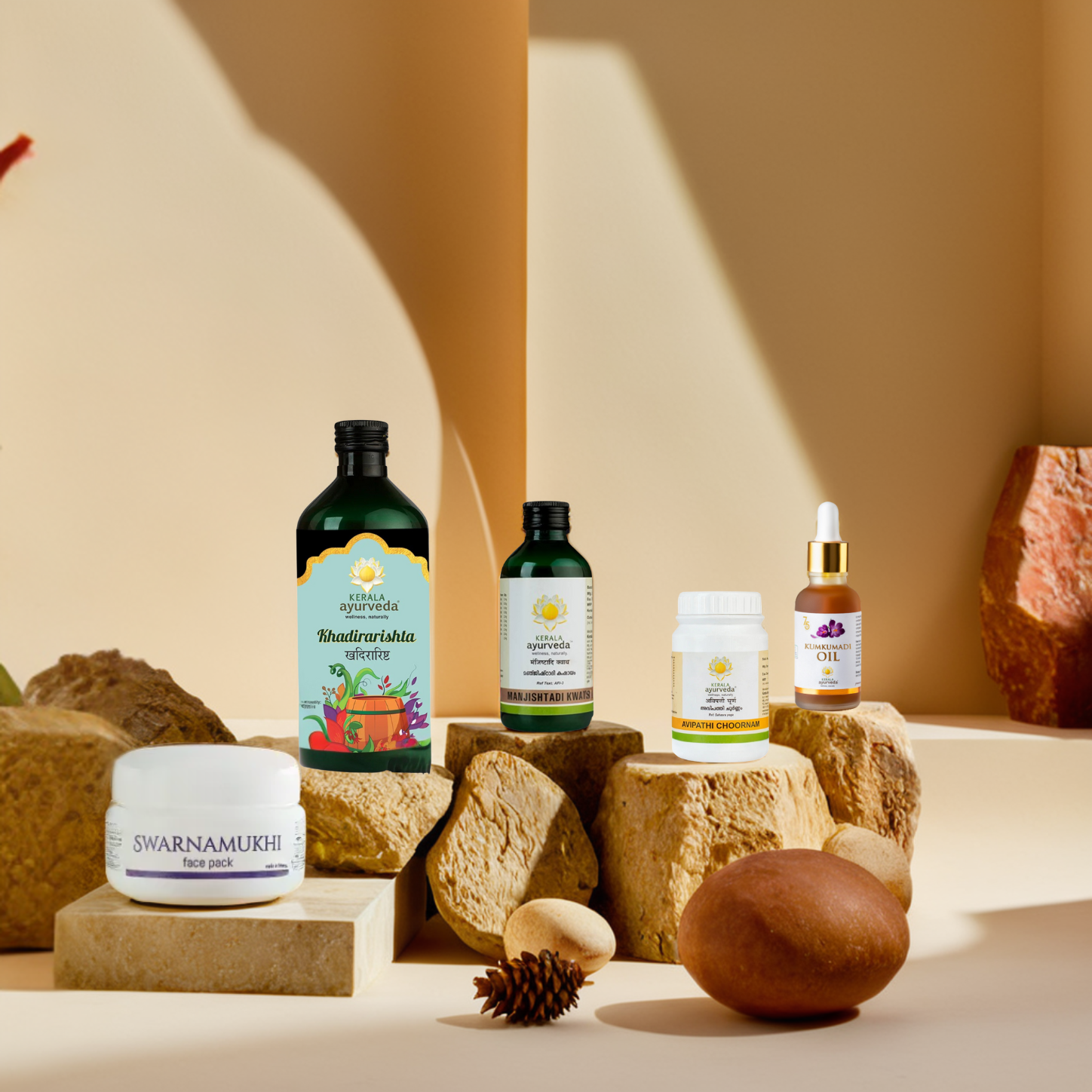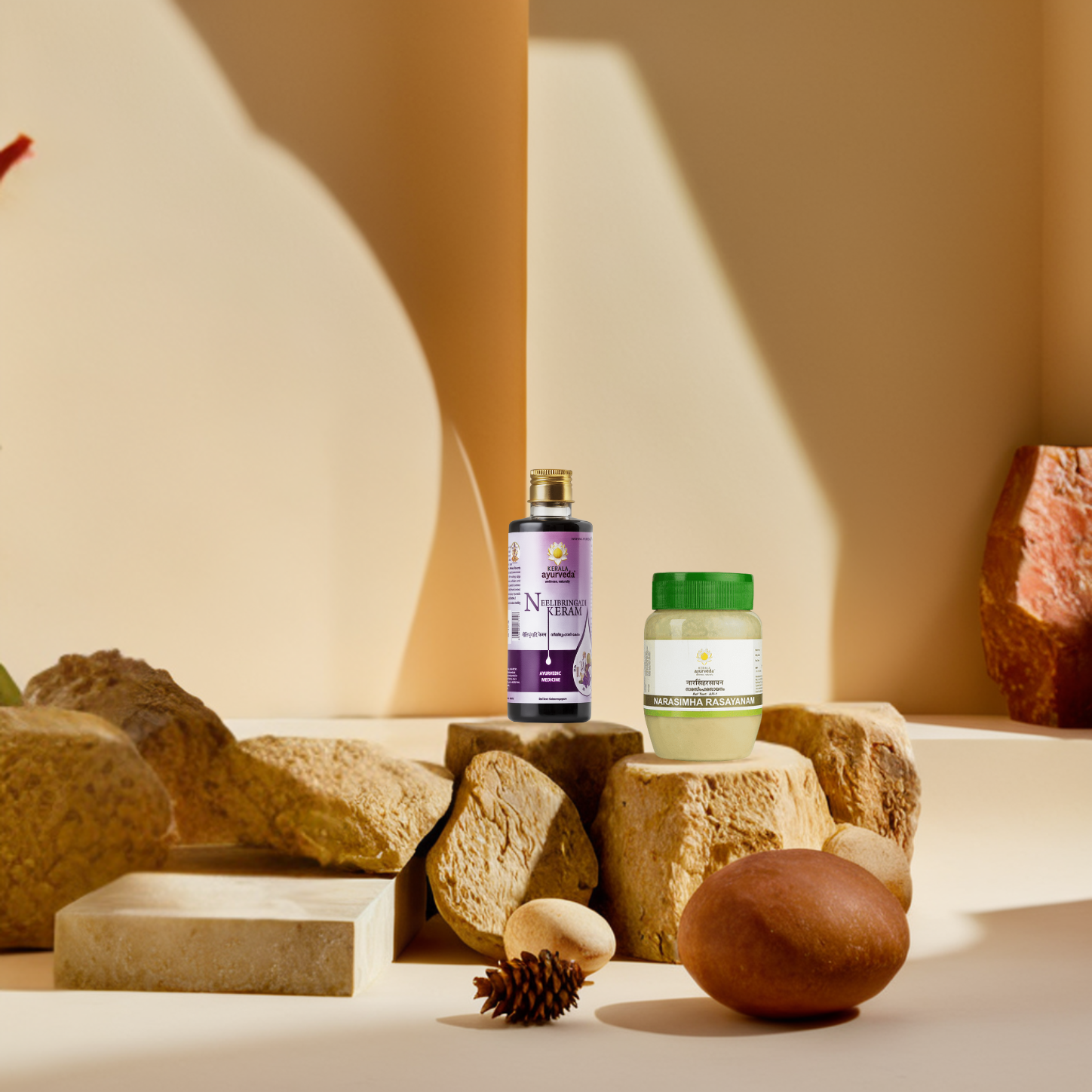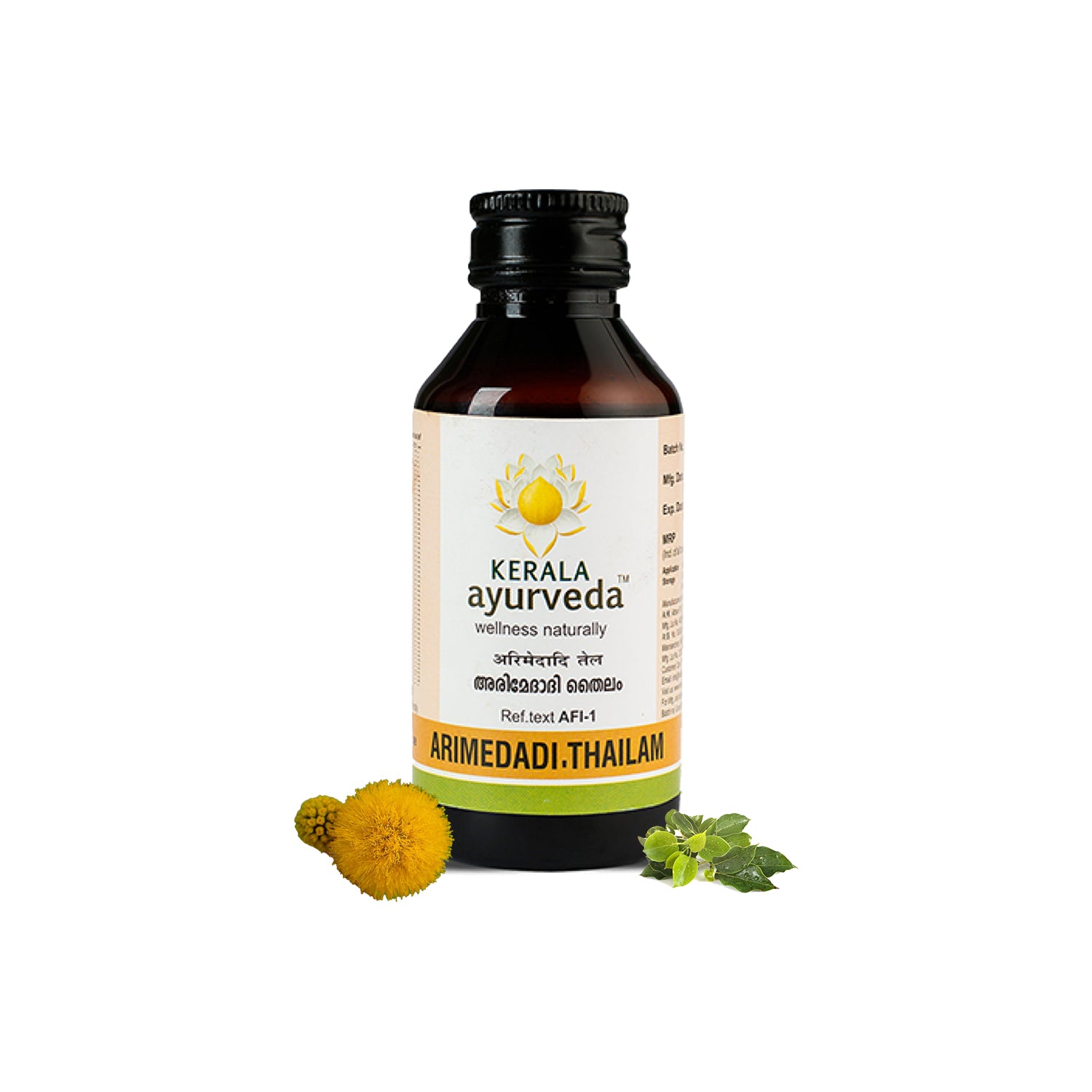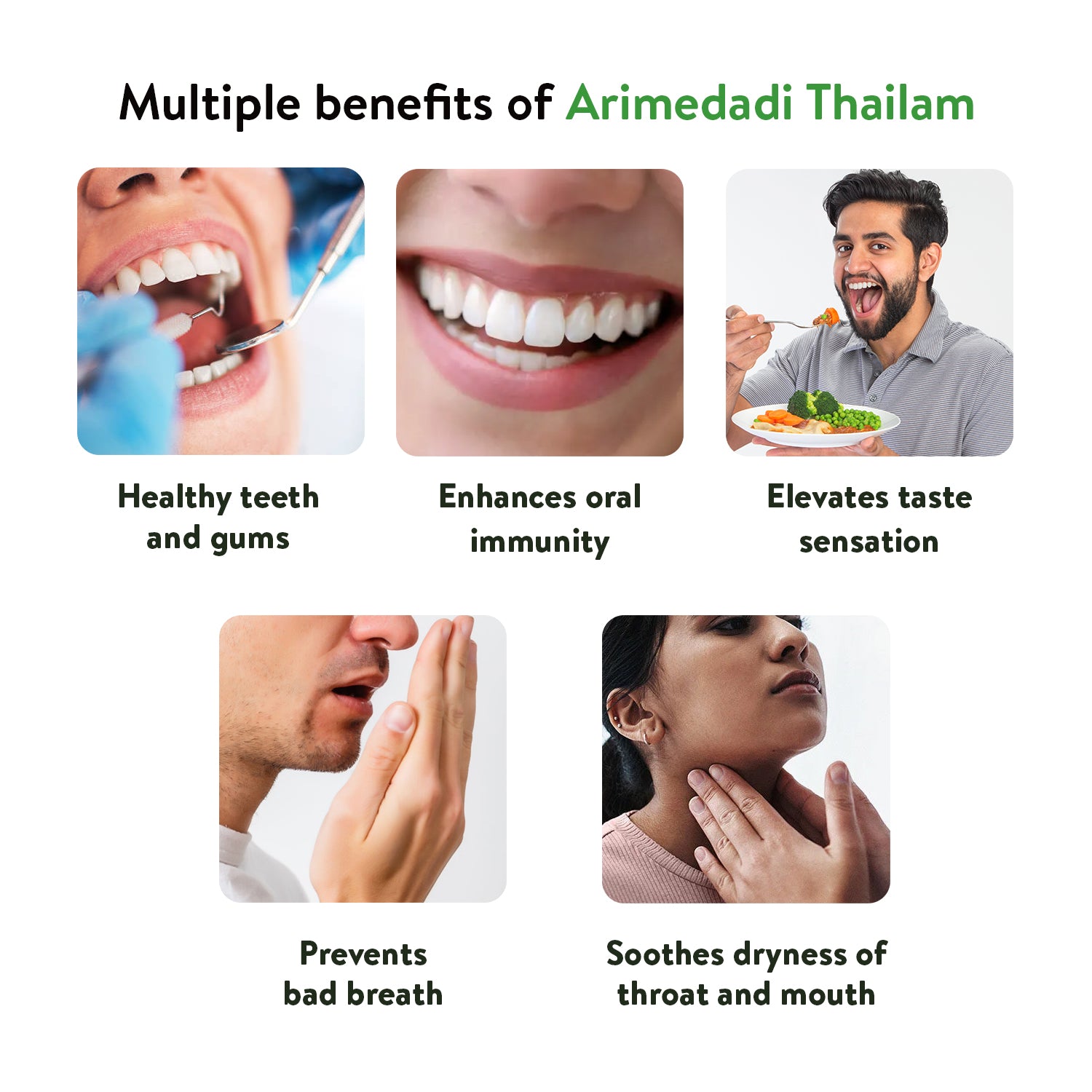Highlights
We usually think of brushing our teeth as the start and end of oral care. Ayurveda reveals that brushing alone only takes care of about 25% of oral cleaning. But if your routine stops there, you should know that you’re only scratching the surface.
Ayurveda says that oral care is a key part of Dinacharya, the daily self-care routine that supports overall health and balance. Simple daily rituals like oil pulling, tongue scraping, applying collyrium (eye wash) to the eyes, and nasal oiling go beyond surface-level care. They help clear toxins, wake up your digestion, and leave you feeling fresher than any minty toothpaste ever could. To achieve optimal oral health, Ayurveda recommends adding the practice known as oil pulling.
What is Oil Pulling?
Oil pulling involves swishing oil in the mouth to cleanse and detoxify the oral cavity. To do oil pulling, take a tablespoon of oil (Sesame or Coconut) and swish it around in your mouth for about 10-15 minutes, making sure it reaches all areas of your mouth. Afterwards, spit it out and rinse your mouth with warm water.
Although it’s gaining popularity today, oil pulling has deep roots in Ayurveda, dating back to around the 4th century BC. It was once a daily routine or Dinacharya to address common dental problems such as tooth sensitivity, cavities, bad breath, and loose teeth.
In Ayurveda, two key therapies—Kavala and Gandusha—are still practiced to cleanse the oral cavity. While both focus on oral detox, the difference lies in the method:
- Gandusha involves holding a medicated oil or decoction in the mouth for a set period without gargling.
- Kavala requires holding the oil in the mouth and then gargling it for a short time.
Oil pulling is essentially the practice of Kavala therapy and should be a regular part of your routine to promote health and longevity. Ayurvedic practices extend beyond oil pulling to support comprehensive oral care and wellness.
Ayurvedic Practices for Oral Hygiene and Overall Wellness
In Ayurveda, taking care of your mouth is about more than just brushing your teeth. It’s a whole-body approach that also looks after your head, neck, ears, and eyes. Ancient Ayurvedic texts, like the Ashtanga Hridaya, emphasize the importance of swishing with different substances to help keep everything in balance. These simple practices go a long way in supporting your overall health. Here are some key Ayurvedic oral care habits to add to your routine:
- Swishing with Warm Water: Swishing with warm water helps promote oral cleanliness and supports the health of the head, neck, and mouth area.
- Swishing with Herbal Decoctions: Herbal decoctions, made from specific medicinal herbs, can be used for additional cleansing and to address specific health concerns related to the mouth and throat.
- Sesame Oil or Arimedadi Tailam: For regular use, Ayurveda recommends sesame oil or Arimedadi tailam (a special medicated oil from Sahasrayoga). These oils help maintain oral hygiene, strengthen the gums, and promote overall oral health.
- Medicated Liquids for Specific Oral Issues: In cases of specific oral health problems such as cavities, gum inflammation, or bad breath, an Ayurvedic practitioner may prescribe a special medicated liquid for swishing. This remedy is tailored to address the root cause of the issue.
Add these Ayurvedic practices to your daily routine, and you'll be on your way to maintaining great oral health.
Why You Should Add Oil Pulling to Your Daily Routine?
Adding oil swishing to your day brings a ton of benefits, not just for your teeth but for your overall health. Here's why it’s worth trying:
- Cleanses the Mouth: Oil pulling helps remove toxins and harmful bacteria from the mouth, promoting a cleaner and healthier oral cavity.
- Freshens the Mouth: Swishing oil in the mouth enhances freshness, leaving your mouth feeling clear and revitalized throughout the day.
- Eliminates Harmful Microbes: Regular oil pulling eliminates harmful bacteria that contribute to dental problems such as cavities, bad breath, and gum disease.
- Strengthens Teeth and Gums: Oil pulling nourishes the gums and strengthens teeth by removing impurities and promoting overall oral health.
- Heals Mouth Ulcers and Bad Breath: Helps soothe mouth ulcers and freshens breath, offering relief from discomfort and unpleasant odors in the mouth.
- Supports Overall Health: Beyond oral hygiene, oil pulling improves vision and enhances overall health by promoting detoxification and strengthening the immune system.
- Prevents Throat Infections: Oil pulling boosts immunity, helping reduce the frequency of throat infections and promoting better health in the throat area.
- Aids Digestion: Cleansing the oral cavity through oil pulling stimulates digestive processes, contributing to overall digestive health and well-being.
- Prevents Dental Problems: Regular oil pulling can prevent common dental issues like toothaches, cavities, gum disease, and tooth sensitivity over time.
Oil pulling, rooted in Ayurvedic tradition, is more than just a simple oral hygiene practice; it's a powerful tool for overall health.
Conclusion
Oral hygiene, the Ayurvedic way, goes beyond simple brushing. It’s a holistic practice that nourishes the mouth, supports digestion, and boosts overall health. By integrating practices like oil pulling and other Ayurvedic methods into your daily routine, you can achieve healthier teeth, gums, and a more balanced body.
Enhance your oil pulling routine with natural products like Arimedadi Tailam that strengthen gums, reduce plaque, and promote overall oral health. Explore our range of Ayurvedic oral care products and take the first step toward a healthier, more vibrant smile.
FAQs
1. How to maintain oral hygiene as per Ayurveda?
In Ayurveda, oral hygiene is maintained through daily practices like oil pulling, tongue scraping, and swishing with warm water or herbal decoctions to cleanse and detoxify the mouth.
2. How to clean teeth at home according to Ayurveda?
To clean teeth at home, Ayurveda recommends using a natural toothbrush (like neem or miswak) along with herbal powders or pastes to maintain oral health and prevent gum problems.
3. How to reverse tooth decay in Ayurveda?
Ayurveda recommends Arimedadi Tailam for strengthening tooth roots, preventing dental issues, promoting gum health, and supporting oral immunity. While it helps prevent further damage, a complete reversal of decay requires professional care.
4. Which drinks help cleanse your mouth?
Green tea and black tea help cleanse the mouth by washing away dental plaque, reducing cavities, and strengthening enamel due to their natural fluoride content.







